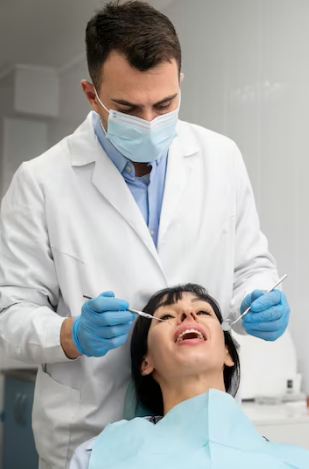Dental emergencies can happen unexpectedly and cause significant pain and discomfort. When faced with a dental crisis, it's crucial to know what steps to take to minimize damage and seek immediate care. There are several options available for Emergency dentists in kansas city. In this article, we will discuss common dental emergencies and provide guidance on what to do when faced with a dental crisis.
Common Dental Emergencies
Dental emergencies can range from sudden toothaches to broken teeth or injuries to the mouth. Here are some common dental emergencies that require immediate attention:
-
Severe Toothache: Persistent or severe toothaches can indicate an underlying dental issue such as an infection or tooth decay.
-
Knocked-Out Tooth: If a tooth is knocked out due to trauma or injury, prompt action is necessary to increase the chances of successful reattachment.
-
Cracked or Broken Tooth: Cracked or broken teeth can cause intense pain and may require immediate treatment to prevent further damage.
-
Lost Filling or Crown: If a dental filling or crown becomes dislodged or falls out, it's important to seek dental care as soon as possible to protect the affected tooth.
-
Injury to Soft Tissues: Injuries to the lips, gums, cheeks, or tongue that result in excessive bleeding or severe pain require immediate attention.
What to Do in a Dental Crisis
When faced with a dental emergency in Kansas City, it's important to stay calm and take the following steps:
-
Contact an Emergency Dentist: Call a Kansas City dental office that offers emergency dental services. Explain your situation and schedule an appointment as soon as possible.
-
Manage Pain and Swelling: Use a cold compress or ice pack on the affected area to help reduce pain and swelling. Over-the-counter pain relievers can also provide temporary relief until you receive professional dental care.
-
Handle a Knocked-Out Tooth: If a tooth is completely knocked out, gently rinse it with water without scrubbing or removing any tissue fragments. Try to place the tooth back into its socket if possible. If not, keep it moist by storing it in a container of milk or saliva until you can see a dentist.
-
Protect a Cracked or Broken Tooth: Rinse your mouth with warm water to clean the area. Use a cold compress to reduce swelling and cover any sharp edges with dental wax or sugarless gum to prevent injury to the tongue or cheeks.
-
Save Dislodged Dental Restorations: If a filling or crown comes out, keep it safe and bring it to your emergency dental appointment. Avoid chewing on the affected tooth until it can be repaired or replaced.
Seeking Emergency Dental Care in Kansas City
In Kansas City, there are several dental practices that offer emergency dental services. When searching for emergency dental care, consider the following factors:
-
Availability: Look for a dental office that provides emergency services during extended hours, including evenings and weekends.
-
Experience: Choose a dentist with experience in handling dental emergencies. They should be well-equipped to address various types of dental crises effectively.
-
Location: Select a dental practice that is conveniently located in Kansas City, ensuring quick and easy access during emergencies.
-
Insurance and Payment Options: Check if the dental office accepts your insurance or offers flexible payment options to minimize out-of-pocket expenses.
Remember, time is of the essence when it comes to dental emergencies. Seeking immediate care can prevent further complications and increase the chances of saving a tooth.
FAQs (Frequently Asked Questions)
Q: Is emergency dental care covered by insurance?
A: It depends on your dental insurance policy. Some dental insurance plans cover emergency dental care, while others may have specific limitations or requirements. It's best to contact your insurance provider to understand your coverage for dental emergencies.
Q: What should I do if I have a dental emergency but don't have dental insurance?
A: If you don't have dental insurance, you can still receive emergency dental care. Many dental offices offer flexible payment options and may have dental discount plans or financing options available. Contact the dental office and explain your situation to explore available options.
Q: Can I go to the emergency room for a dental emergency?
A: In most cases, it's recommended to seek emergency dental care from a dentist rather than visiting the emergency room. Dental professionals have specialized training and equipment to handle dental emergencies effectively. However, if a dental emergency occurs outside of regular dental office hours and involves severe facial swelling, uncontrolled bleeding, or trauma to the head or face, it may be appropriate to visit the emergency room.
Q: How can I prevent dental emergencies?
A: While dental emergencies can happen unexpectedly, practicing good oral hygiene, wearing mouthguards during physical activities, avoiding chewing on hard objects, and scheduling regular dental check-ups can help reduce the risk of dental emergencies. Additionally, promptly addressing dental issues such as cavities or cracked teeth can prevent them from worsening and potentially leading to emergencies.


No comments yet